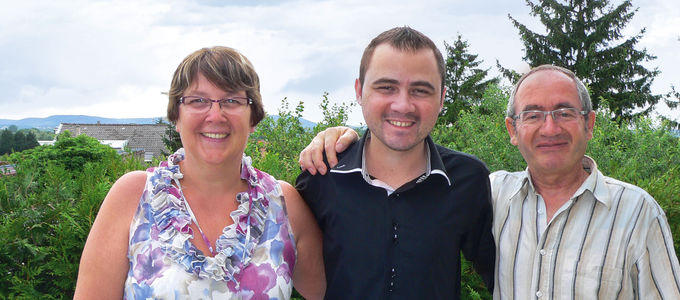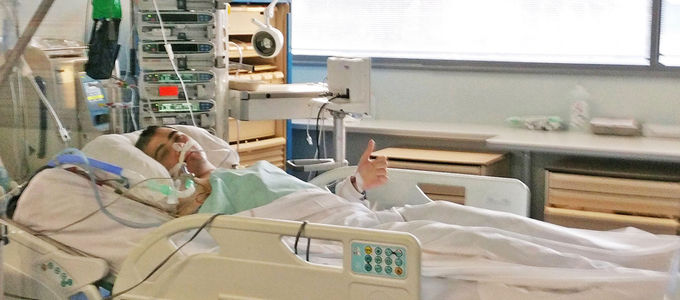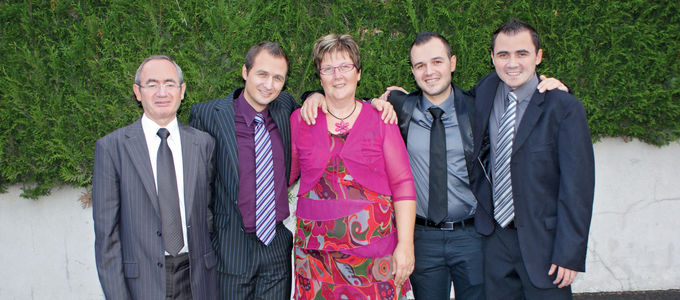“I had to learn to breathe again”
“God loves me and blesses me.” The man who says this often has to literally fight for every breath he takes. Florent Girard, who lives in France, was born with cystic fibrosis, a genetic condition. Where does he take the strength to cope with it?
Florent was born in 1982. He is the first child of Patricia and Bernard Girard. Bernard is a Deacon in Amnéville (France) today. Already as a baby Florent often had infections, but the doctors did not think it was potentially serious.
Then, when he was two years old, he had a serious infection with a very high temperature, and Florent’s mother insisted that the cause be found. “Three weeks later we were told that Florent had cystic fibrosis,” she says. “We knew nothing about the disease at the time.” Only a year later, when the parents joined a support group, did they realize how serious a diagnosis this was.
Why Florent?
Cystic fibrosis is a genetic disorder that affects mostly the lungs, but also other organs. The secretions of the lung and other organs, which are thin in healthy people, are thick and sticky and they obstruct the fine branches of the bronchi, leading to respiratory problems. Cystic fibrosis is incurable. If detected early, treatment can slow down the progression of the illness significantly.
The disease only breaks out if both parents pass on a certain gene. “I have two sisters, and the three of us all married sons from the same family, the Girards,” Patricia Girard says, and asks herself: why Florent of all people? Her son’s answer: “It would be a lot more painful for me if my brothers were sick. I thanked and still thank God that they are healthy.”
His first childhood memories are of having to stay in bed with a humidifier for twelve hours at a time and with a tent over his bed. When he started school he regularly had to go to hospital for two to three weeks. Life-threatening complications prevented him from writing his final exams. He had to abandon his plans to study law. He even had to abandon training and working in an institution for disabled people. “The most important thing my parents taught me is to trust in God,” Florent says.
With church songs off to sleep
Already as a small boy, Florent felt the intercessions of his brothers and sisters at Church. A touching experience in a divine service—he was actually mentioned by name in a prayer, which is anything but usual—gave him new courage and hope. The antibiotic therapy he was receiving was beginning to be more effective and for a longer term. Things were looking good the doctor told the then 23-year old with a big smile: “What happened? How is this possible?”
By 2012/2013 Florent knew that a lung transplant could not be put off much longer. The surgery was scheduled on 27 November 2015 at 3.30. “I sang our church songs, all of them, as they came into my head,” Florent reports of the time shortly before he was put to sleep.
The surgery lasted ten and a half hours. His parents were waiting at home, anxious, and did not stop praying. Deacon Girard remembers: “Afterwards we were told that Florent had lost a lot of blood and that his heart had stopped, but because a third surgeon happened to be there at that moment they were able to respond quickly.”
Florent describes waking up from the anaesthetic as follows: “I saw myself in our church and the choir was singing: ‘Come, everyone, and join our song: God loves us all.’ Then I opened my eyes and found myself in intensive care, thinking: ‘Wow, it worked. Thank You, God.’”
What the disease has taught us
“I actually had to learn to breathe again, but I can do a lot of everyday things now—like taking a shower, climbing stairs, and eating—that were difficult for me before.” And he is very happy that he can go to church more often now. “I really missed that.” Divine services for the departed are very special for Florent: “I really feel a need to remember the person whose lung I received.”
He wants to wait and see how the first year with his new lung goes: “If I feel good I would like to train for the job that I was recommended for thirteen years ago.” A place of his own and a relationship are also on his to-do list. “I always ignored my emotional needs. I did not want to burden anyone with my illness.”
“The disease has taught me a lot: it is important in life to be understanding and sympathetic and to have an ear for the needs of others; to believe in God and to stay on this way. I wonder if I would see things this way if I had not been sick?” he asks and adds, “The disease really robbed me of a lot. But the love of God, the love of my family, of my friends and the brothers and sisters is something that cannot be taken from me.”
Article info
Author:
Date:
Keywords:
Dinara Ganzer,
Andreas Rother
18.01.2017
France,
Congregational life,
People/Personalities












